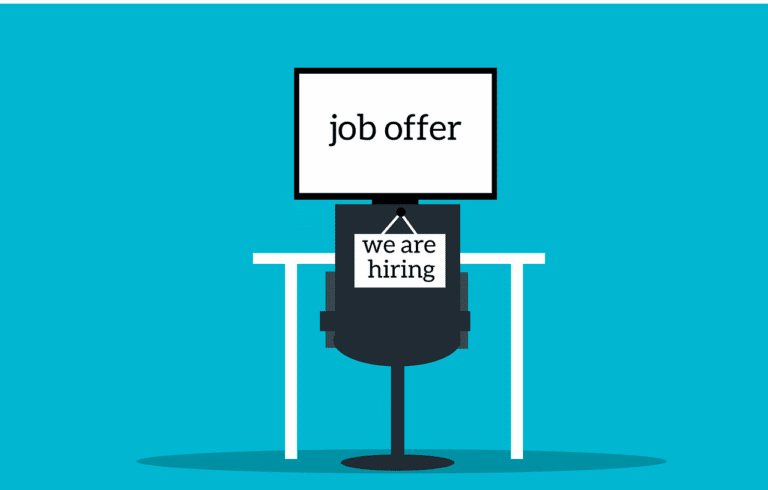5 Top Tips for How to Accept a Job Offer (2023)

You’ve got the job! Well done! Still, do you know how to accept a job offer over the phone, by email or in person so you make the best impression on the new company?
You may think it’s simply a case of saying, “thank you very much. When can I start?” but you can do so much better than that.
This guide will show you how to accept a job offer, negotiate terms and start your exciting new career.
Contents
- You’ve received a job offer. Now what?
- Tip #1 Take Time to Reflect on the Job Offer
- Tip #2 Be Prepared to Negotiate
- Tip #3 Be Enthusiastic
- Tip #4 Get the Job Offer in Writing
- Tip #5 Accept the Job Offer in Writing
- Conclusion: 5 Top Tips for How to Accept a Job Offer
You’ve received a job offer. Now what?
Finding a new job can be challenging and soul-destroying. You spent many hours preparing your resume, writing a perfect cover letter, emailing hiring managers, and wondering if they had read your application.
You’ve learned how to tailor your resume to match the keywords in the job description. Ah, yes, you know about Applicant Tracking Software (ATS) screening out dozens of resumes without the pre-requisite keywords, and still, you hear nothing.
You’ve attended multiple interviews, one-to-one and group sessions, and you wonder if hiring managers even know what they genuinely want from a candidate because they never call you back. You wonder, is it you? You have the skills that hiring managers say they want, yet you still have no job offer.
Then, the day arrives when you finally get the job offer. Your consistent hard work has paid off. You survived the ATS screening, the phone interview and one or two face-to-face interviews, and you’ve nailed them all. The hiring manager finally says, “you’re hired“, and you’re ready to start the perfect job.
Getting a job offer on the spot is rare, so you’ve likely received an email or phone call. We get it. You’re super excited and want to shout, “Yes, when do I start?” But wait. Before responding to the job offer email in microseconds or bursting the hiring manager’s eardrums with your enthusiastic whooping on the phone, let’s take a moment.

Tip #1 Take Time to Reflect on the Job Offer
Jumping into a job without reflection could land you in deep water. You could find yourself working for the best organisation on the planet or suddenly discover you’ve landed the job from hell.
A little reflection gives you time to spot potential red flags, prepare questions and clarify the job offer. Most employers will respect an individual asking for a day or so before responding.
Firstly, confirm your appreciation for the job offer and express your interest. Secondly, give the hiring manager (or recruiter) a firm timeframe for when you will get back to them with an answer. 24-48 hours is acceptable because the hiring manager has other candidates to contact. The hiring manager can offer the position to someone else if you decline the offer.
During that time, the following are a few questions you can ask if you don’t already have the answers: –
- What (exact) tasks will the job entail? You could hate your job if these tasks aren’t clear from the offset. It’s easy to get carried away in the excitement of a job offer, but get clarity of your exact job requirements before signing the contract
- Ask to meet your direct manager: You may have met your manager during the interviews. If not, ask for a quick meeting to assess their leadership and communication style
- If possible, ask if you can meet the team: Even the job of your dreams will fall apart if you’re working with a dysfunctional team
- Clarify the employee package: Include holiday entitlement, healthcare, sick pay, pension, share options etc. In addition, other factors could include maternity or paternity leave, remote or flexible working
- Promotion prospects: Does the company promote internally where possible?
- What is the work culture? You can sometimes determine workplace culture from the organisation’s missions and values, but it’s an excellent question to ask
- Expected hours? Clarify the number of required hours for your job
- Will overtime be required? If so, how are employees compensated?
- Salary: Is the salary sufficient to cover your needs? For instance, will travelling costs deplete your income if flexible or remote working isn’t available? How does the pay compare with industry standards and location?
Be confident about asking the above questions. The job must be right for you before you accept the offer. For example, if you expect more money and the salary isn’t enough to cover your expenditure, it’s fair to ask if the company can increase the offer.
Tip #2 Be Prepared to Negotiate
After clarifying questions about the job, you now decide you want to accept the position. However, there might be a few things you’d like to negotiate. You may wish to request flexible or remote working, an increase in salary or ask for help with relocation costs.
The best time to negotiate is after expressing your intention to accept the job subject to negotiations and before receiving a written contract. Be realistic. Negotiating a higher salary because you think you’re the best person for the job may not be the right thing to do. Whatever you ask for, provide a genuine reason for negotiating terms.
Tip #3 Be Enthusiastic
Recommendations for how to say you accept a job offer include being enthusiastic, which is at the top of the list.
During negotiations, express enthusiasm and excitement for the job. Show appreciation and share ideas. A great attitude shows the hiring manager that you aren’t “messing them about” with your negotiations. Back up your requests by constantly reiterating your keenness to start the new role.
Tip #4 Get the Job Offer in Writing
A job offer received in an email is not a formal offer. For your peace of mind, ask for a written job offer containing terms of employment. If the job is remote and your employer is across the other side of the globe, that’s not an excuse. The company can create an online document that you and they can sign and then forward a PDF copy.
If the employer says they don’t do written offers, request one anyway so that you can officially accept the job. A lot can happen between receiving and taking a job offer. It’s not uncommon for job offer retractions, with organisations suddenly announcing they hired in-house or for another reason. It is in your interest to get a written job offer as soon as possible.

Tip #5 Accept the Job Offer in Writing
You might want to know how to accept a job offer via email. The choice is yours, whether you create a formal letter of acceptance or send your response by email. Whatever you decide, make sure to edit your document by running a spell and grammar check, or get a friend or partner to read it before sending.
- Address the letter to the person who offered you the job
- Express appreciation for the offer and excitement about starting the job
- Make a clear statement of job acceptance
- Include specifics: Job position & tasks, start date, salary, location, and hours of work etc
- Conclude by expressing enthusiasm for getting started in the new role
Example acceptance letter of how to accept a job offer
“Dear Miss Butler,
Thank you for the official job offer yesterday [24th November 22] for the role of senior blockchain developer at [ABC Company]. I am happy to accept your offer and excited to start working with the team.
As discussed, I accept the annual starting salary of £95,000 for working 35 hours a week, with paid overtime (at £95 per hour) as required by the company. I will attend [ABC Company] office in [location] two days a week and work from home three days a week, with some flexibility if needed.
I confirm the start date as 13th December 2022 and look forward to meeting everyone on the team and cannot wait to get started in my new role.
Once again, thank you for offering me this fantastic opportunity.
Yours faithfully
N. E. Turnpike”
If you are required to work a notice period with your previous employer, staying in touch with the new company is important. For example, if you’re working on four weeks’ notice, after a fortnight, send an email saying how much you are looking forward to starting the new job. If possible, you could ask to attend meetings or get-togethers to get to know your future colleagues before you start.
Also, burning bridges with your current company is not a great idea. In the unlikely event that a job offer falls through, at least you still have a job. Tell your manager and colleagues how much you enjoyed working with them and why you are leaving. Express regret that you’re going and offer to stay in contact.
Conclusion: 5 Top Tips for How to Accept a Job Offer
You know how to accept a job offer by email or phone, and that is to not immediately jump in the air yelling, “yes, yes, when do I start?”. Maybe do that afterwards. Firstly, show appreciation for the offer and ask for some time to consider. Prepare a list of questions to clarify whether it’s the right job for you, and then negotiate changes in terms if needed.
If you’re looking for a new job, fed up with being ghosted by hiring managers or led down dead-end roads by recruiters, contact the specialist team at CB Recruitment to discuss your options so we can help you find the job of your dreams in Web3.
About Author

Jan Barley
Jan is a SEO copywriter, brand advisor, content strategist & case study specialist writing for crypto, recruitment, and SaaS companies. Jan lives in the Cotswold's UK with two rescue dogs. Since 2020, Jan has written hundreds of SEO articles for various crypto companies including CB Recruitment & Coin Bureau.
Top Posts

Why Employee Benefits Are Important To Retain Your Workforce
Why are employee benefits important? Since the great resignation of 2021, employees have become sign...

10 Popular Time Management Interview Questions: How to Answer
Why do companies ask candidates time management questions? Effective time management in the workplac...

How to Find the Best Recruitment Consultant (2023)
When looking for a reliable recruitment consultant, you may be concerned about whether they genuinel...


